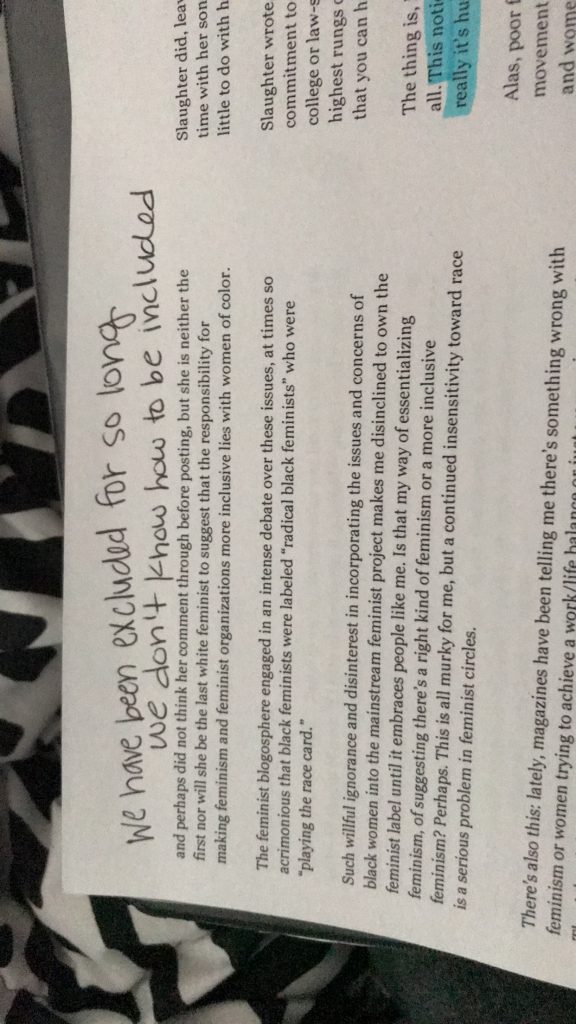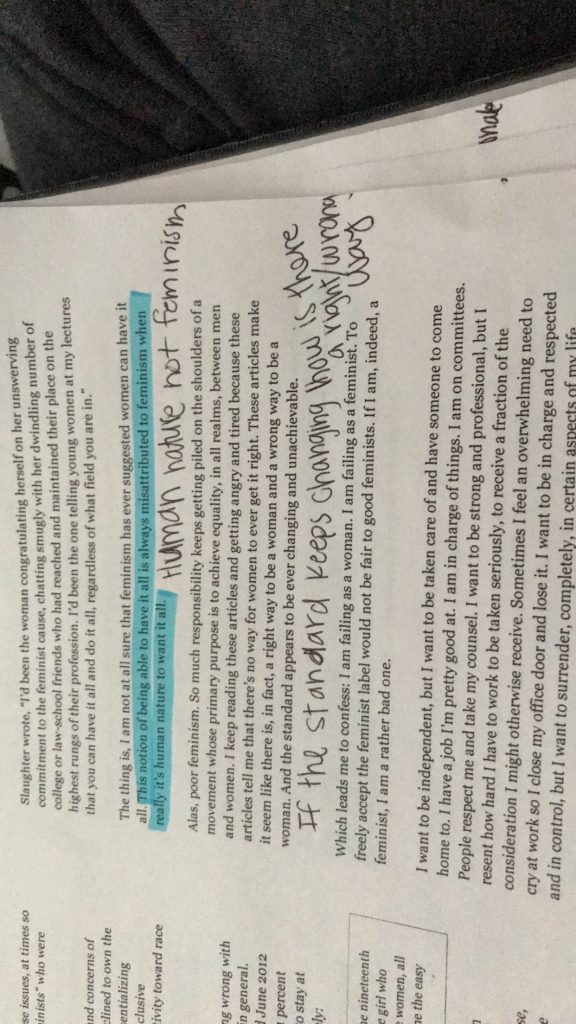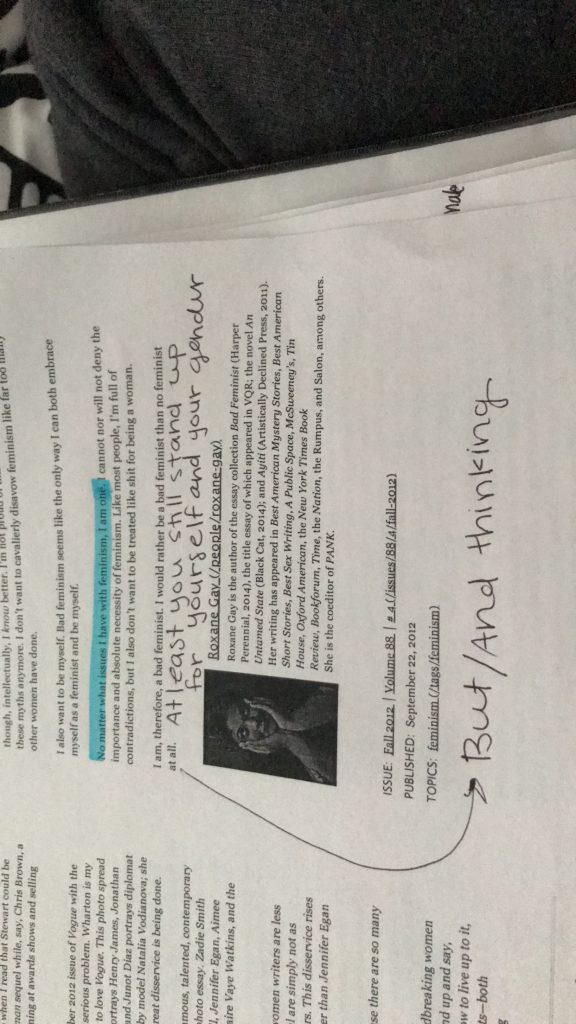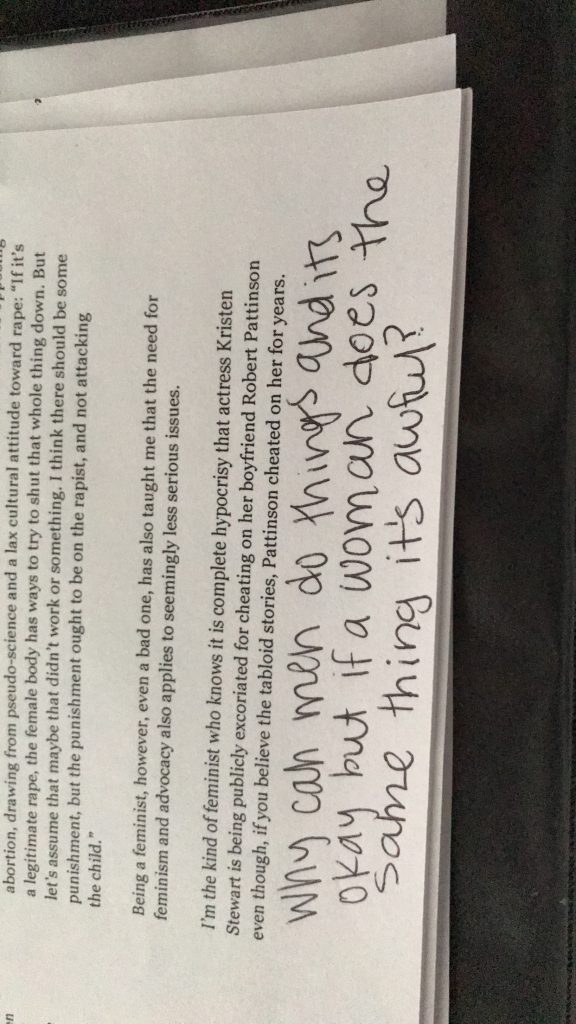I could have done better to prepare for this last paper. I missed classes and did not complete all of the homework leading up to the paper. By not completing all of the reading when they were due, I was behind in the discussion in class so I was not able to get the most out of talking with my classmates. I did complete the first assignment which is under my reading log with my annotations on the assigned pages. I also have quotes from the first section of the Yoshino document in my quote/word bank. My quotes were very useful in the structure of my paper. I think I am not yet meeting my goals on the engagement with the text because I fell behind on the material but I think I am getting on a path towards becoming an expert now that I am aware of the effort necessary to do well in the course. My writing could have used more elaboration on the ideas that I had for clarification to what I believed. I also could have integrated my ideas with the sources. I have not yet reached the goal of using the source to sufficiently support my argument. I am a novice in many areas that I should be excelling at during this stage of the writing process.
Essay 2 Prewriting Activity
a. According to Yoshino covering is “to tone down a disfavored identity to fit into the mainstream.” I believe this means not showing parts of your identity that would be considered annoying or would put you in a bad light. In my experience I have being “covering” being loud or outgoing because it can be seen as annoying and unfavorable by other people.
b. Winnicott states that “The True Self is the self that gives an individual the feeling of being real, which is “more than existing; it is finding a way to exist as oneself, and to relate to objects as oneself, and to have a self to retreat for relaxation.” He further explains that the False Self protects your True Self by conforming the False Self to what is expected by “environmental demands.” The False Self’s one positive function is to protect the True Self. “Winnicott believes both selves will exist even in the healthy individual.” He thinks the False Self is eventually only used as a “polite and mannered social attitude” so that the True Self can be recognized.
Preface and The New Civil Rights paragraphs 1-19



“A Toast Story” Notes






Stories of my name
My mom says when she was pregnant I would always kick when she would watch figure skating on tv. She thought I would become a figure skater. So she named me Daria after a Russian figure skater from 1998. I have not found who this figure skater is but according to my mom I was most active while she would skate. Most people older than me associate my name with the MTV show “Daria” which for the most part I can relate to. She is someone who is very sarcastic and has a dry sense of humor which I believe most of my friends with agree I can at times.
My nickname from middle through high school was DarDar which was given to me during a school activity that I can’t quite remember but it stuck. This is name that came from a fellow classmate and that many of my classmates referred to me as.
Many people mispronounce my name in different ways. Most commonly I get the “Dar” pronounced like dare followed by “ia”. It’s mispronounced so often that I respond and often don’t correct people anymore just because they usually continue to mispronounce it.
While my first name has no significant meaning to my family, my middle name has a connection to my mom’s side of my family. My middle name is Christina and it was given to me by my mom because it was my great grandmother’s middle name. This name has a lot of meaning because my great grandmother asked for it to be in my name as the first or middle name. My mom and grandmother feel that it connects to her since I never met her as she died hours before I was born. So my middle name closely connects me to my great grandmother for my family where as for me I never met her so it connects me to my family who thinks I am a lot like her.
My last name connects me to my dads family. I’m not sure where the Letcher name originates other than from my dads father. In some quick searching I found out that Letcher is a variation of Lecher which is related to someone who lives near a stream. I found that interesting because I live near the Mississippi River, so it’s not a stream but it’s still a body of water. So my last name disconnects me from my mom’s side of my family but my middle name makes up for it with its connection.
Gay annotations part 2




Second set of Gay questions
1. Using but in writing helps strengthen and complicate the argument by adding a different perspective that usually disagrees with what is before the but. Miller and Jurecic state in a table that but is the “foundation for critical thinking”(104). Without but to expand our argument it becomes difficult for people to think deeper and question ideas without being able to challenge them. Without critical thinking many of the ideas and speeches from the past would have far less of an impact. Miller and Jurecic talk about how Abraham Lincoln’s Gettysburg Address would have been far less important if it ended before the third paragraph where he says but. In “Bad Feminist” by Roxane Gay uses but thinking to turn the paper towards her perspective. Gay states, “I used to say my favorite color was black to be cool, but it is pink – all shades of pink”(7). The world tells us that to be a feminist you can’t like things that are feminine like the color pink. This but statement strengthens her point that she is a feminist, but she is a bad one by society’s standards of how a feminist should look and act like. By her developing her idea through using but makes you think deeper about the topic as a whole.
2. The sisterhood Gay is referring to is the “anger, humorless, militancy, unwavering principles, and a prescribed set of rules for how to be a proper feminist woman, or at least a proper white, heterosexual, feminist woman…(1). The article starts as a but thinking article but switches to and thinking after she has established her ideas on the feminism that is seen by the world. And thinking “…is the act of connecting like to like, with thoughts or observations like together via the explicit or implicit use of and”(Miller&Jurecic 101). Using and adds information but doesn’t had information that is different from the previous information given.
Signal phrases, embedded quotations, summary, and paraphrase revisions
Alexander states a victim in a narrative “is a victim of negative literacy experiences, in or out of school”(Alexander 615).
This is a proper embedded quote because it flows with the sentence and it has a signal phrase.
Being able to compete with your peers is important because “literacy, like land, is a valued commodity in this economy, a key resource in gaining profit and edge”(Brandt 558).
This embedded quote does not have a signal phrase because it flows into the sentence to complete the thought and support my idea.
If people cannot keep up with the expectations that are constantly changing then we enter “the literacy crisis that is, the perceived gap between rising standards for achievement and people’s ability to meet them”(Brandt 559).
This embedded quote helps to strengthen my idea without a signal phrase.
Ciara’s dad inhibits her success by focussing on making sure she would pronounce everything on the page of a book correctly at the age of 5 or 6. This part of learning made her change her outlook on reading. Ciara continued to not read all the way until she was told to read “The Absolutely True Diary of a Part Time Indian” by Sherman Alexie which sparked her interest. Ciara’s experiences with reading continued to get worse; however, she realized she enjoyed writing. She took a low level course with a sponsor named Mr. Furtek who unbeknownst to him enabled her to continue not reading. She realizes she likes writing when she starts publishing articles in journalism class with Mr. Kehrl. Ciara’s narrative ends with her still dreading reading due to her earlier sponsors.
This paraphrase could be improved because it is actually too much summary and could use quotes.
Summary and Paraphrase worksheet
Alexander’s article and my topic are related because it actually categorizes and discusses my topic of victims. Success, Victims, and Prodigies discusses the different themes of literacy narratives from real student narratives that focus on the topics in the title with supported evidence. Alexander’s article shows the different types of narratives through actual student literacy narratives. She also puts the narratives in categories and gives a definition of what should be in the narrative that makes it fit in a certain category.
Brandt’s writing is relevant to my topic because the ideas in her writing will help further complicate my writing with her discussion on sponsorship. Brandt’s writing discusses how a sponsor can either help or inhibit success in any field. Brandt’s Sponsors of Literacy discusses the people who had opportunities and those who did not and how those who did not got around it. She also writes about the importance of literacy because it is how we advance in the world. She also discusses the fact that literacy is a way of competition and those who do not learn it will not be able to compete.
Sponsors elaborate on the many types of human relationships and ideals that are pushed on them that is shown through learning and sharing between ages in different professional settings(Brandt 558).
Some students refuse to view themselves as victims even though they rebel against the system that is placed before them(Williams 344).
“Success narratives” are usually told without a specific time to relate an experience to(Alexander 616).
“Child prodigy narratives” show that literacy will show success, but these narratives also pinpoint a certain experience that reinforces their narrative(Alexander 619).
Deciding a Focus and Relevant Sources
I want to focus on how the victim’s negative experience impacts their ability to keep up with their peers due to their impacted confidence. I will use Brandt and Alexander to support my argument. I will use Brandt because the article discusses those who were victims because they aren’t offered the same opportunity. She also discusses sponsorship which will be a help me further complicate my writing. Alexander’s article categorizes the schema for narratives so that will help me explain what makes a victim in a narrative. I have selected Ashley Harmon, Ciara Oakley-Robbins, and Caroline Wilson as my literacy narratives for right now.
